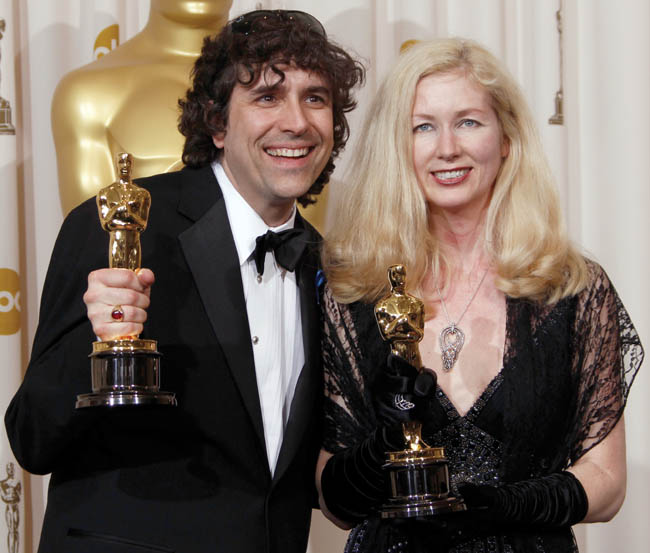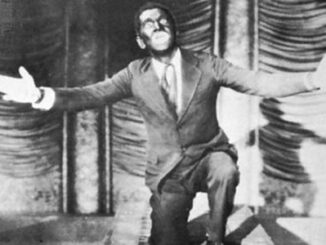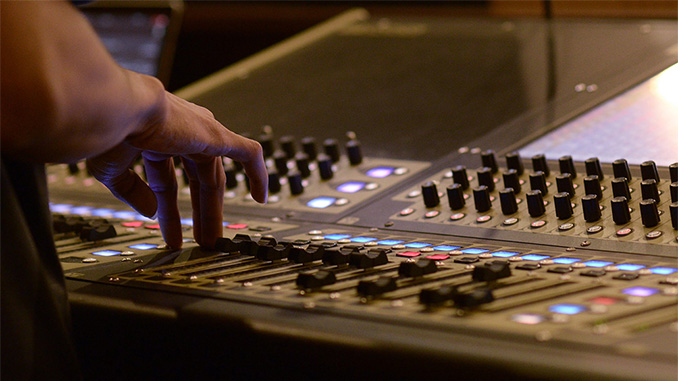
By Leslie Shatz
Go to part 2.
Robert “Buzz” Knudson was born in 1925 in Los Angeles. After graduating high school, he played minor league baseball for 7 years and then went to work in the motion picture industry in 1952. He started working at Todd-AO in 1960 and began mixing feature films in 1970.
His career as a mixer spanned the next 20 years and included such films as, Sea of Love, Who Framed Roger Rabbit, Empire of the Sun, Nuts, The Color Purple, Spies Like Us, Witness, Romancing the Stone, An Officer and a Gentleman, The Blues Brothers, Close Encounters of the Third Kind, Sorcerer and A Star is Born. He has been nominated for 9 Academy Awards and has won three times, for Cabaret, The Exorcist, and E.T. This year he received a lifetime achievement award from the Cinema Audio Society. Buzz is currently Vice Chairman of the Board and Consultant to the Studio at Todd-AO.
Leslie Shatz is a freelance sound designer and re-recording mixer, often wearing both hats on the same film. He has been active in the motion picture industry since 1970. His credits include Timecode, In Dreams, Good Will Hunting, Alien: Resurrection, Blood and Wine, Judge Dredd, Bram Stoker’s Dracula, Rambling Rose, Ghost and The War of the Roses. This year he was nominated for an Academy Award for The Mummy. He talked to Buzz in his office on Seward Street for this two-part interview.
Leslie Shatz: I don’t know if you remember, but we worked together on The Secret Life of Plants in 1977.
Robert Knudson: Well yeah, that was a long time ago.
LS: That was my first introduction to a big time dubbing theater, and I remember you gave me a lot of pointers on how to prepare and mix tracks.
RK: That was back when our console was old.
“When I was working in those days, if I had to go back and redo something that was intricate, just to get one little thing fixed, I sometimes did the whole thing better.” – Robert Knudson
LS: That’s part of what I want to talk about because I’m very interested in the idea that sound is technologically changing – but first I wonder, do you think the role of sound in movies is changing?
RK: I think the change is how we do it. I think the number of people involved are going to be fewer and I think the sound effects editor is more and more wanting to be a part of the final product. And whether that’s good or bad, the jury is out.
LS: I remember when I started out, it was right when the Nagra recorder had been introduced. And that upset the apple cart because it changed the division of labor. How do you see that from today’s perspective? Was that a good thing or a bad thing?
RK: I’m sure they’re recording all digital now aren’t they, in production?
LS: Well, some people are still recording analog because they like the sound better.
RK: Well, it is a better sound.
LS: It can be.
RK: One reason I like it better is because it’s got the noise that we’re used to and accept as being part of real life. But the digital is kind of clean.
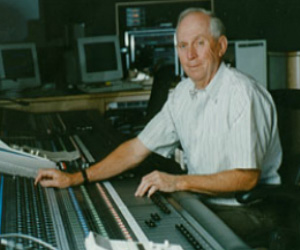
LS: We’ve made all these advances technologically, but haven’t we left behind some stuff that was good?
RK: Well, yeah. Take scoring for instance. As you know, we have a big stage in the valley. It’s probably one of the nicest scoring stages in the country and we’re about to put a console in and we asked them what kind of a digital console they wanted and they all went – thumbs down on the digital console, they all want analog consoles. All the composers and the conductors want them and the mixers all want them. So clean isn’t necessarily better.
LS: Regarding sound quality, that’s one thing, but as for console automation, when you started out console automation didn’t exist.
RK: No such thing. I used to get gray hair when they’d say: “Fix that one little word” and there’s 10 people talking in the scene, and I had to do the whole thing over. Now you go in and fix only the one word.
LS: Maybe it’s less stressful now with the automation, but do you think it produces better mixes?
RK: Oh I don’t think it makes the mixes any better. When I was working in those days, if I had to go back and redo something that was intricate, just to get one little thing fixed, I sometimes did the whole thing better. It was a chance to do it over where most directors would have said, “That’s okay,” when I knew there was something I didn’t like in it. So, I think probably, technology is not an aid on that point. But from a time standpoint, yes it is quicker.
LS: It’s quicker, but we’ve seen the number of tracks that are being delivered multiply.
RK: Oh, it drove me out of business. It really did. I just literally couldn’t handle knowing that all that work was not going to get in the movie. They’d bring in these cue sheets that would go from here to the wall over there and it was beautifully done, beautifully crafted, but nobody would have cared.
In fact, one time a person brought in a lot of tracks, there were too many of them and I was so up to here with it, I took a pair of scissors and cut the cue sheets in half, literally in half. I saw the principal characters and maybe one line of background or whatever, and I handed the rest to him and said, “I know what’s in here, but it’s never going to get in this movie.” It didn’t, nobody missed it and we saved probably two days of going through it with the director saying yes, no, yes, no, you know. So what are we doing? We’re making it an editor’s delight. Bring everything that you’ve got in your library and we’ll throw it out later.
Years ago an editor would cut what was necessary and it was usually because he talked to the director, they communicated better. I understand why they do it now, because they’re covering themselves, because they’ve been nailed so many times and they guessed wrong, maybe the director wanted something specific in there. So now the editor puts everything in. I don’t complain about him doing it. It’s just that it creates a lot of work, and time is money in this game. What we’re paying the help and what we get for the work are so radically out of balance now, it’s not a very profitable business.
“Exorcist was the first encounter with weird sounds. And I guess they can do all that now, with this high-tech equipment, by pushing buttons.” – Robert Knudson
LS: So you crossed over entirely into management in 1982, something like that?
RK: ’82 about, yeah.
LS: Would you say that it was a much more profitable business then?
RK: Oh yeah. The numbers were staggering. And we were very economically priced. We weren’t higher than anybody else or lower than anybody, but we stayed right in the mainstream. Nowadays it’s a job. We’re so big now. We bought Glen Glen in ’86 or ’87, they had a lot of television, then we started buying other companies. We’ve got 26 stages just here locally. And to keep 26 rolling every day and if they’re aren’t rolling, you’re not making any money. So it’s a struggle now. It’s not like it used to be.
LS: We’ve also seen the salaries for mixers increase.
RK: They’ve gone crazy. They all make over-scale to start with, which I’ve always questioned. I have no problem with people making all kinds of money. But it seems to me that you need to do something better or do more of it to get more money out of it. That isn’t how it works today. Today they expect a raise every year. Well, what has he done differently from the year before that he requires a raise? And your top 10 or 15 guys are making a ton of money. If they keep the stage busy and they can get top dollar for it, bless their soul because then you can make it work for everybody.
LS: Do you have any regret that you’re not mixing now making that big money?
RK: No, I’ve been very fortunate. They’re not going to hold any benefits for this kid I’ll tell you. I’ve been very fortunate and I’ve worked for some great people and I’ve had opportunities to go other places and I stayed here and I’m glad I did. More power to them if they can make a ton of money. I hope they’re saving it.
LS: I understand you started as a baseball player; is that right?
RK: Yep.
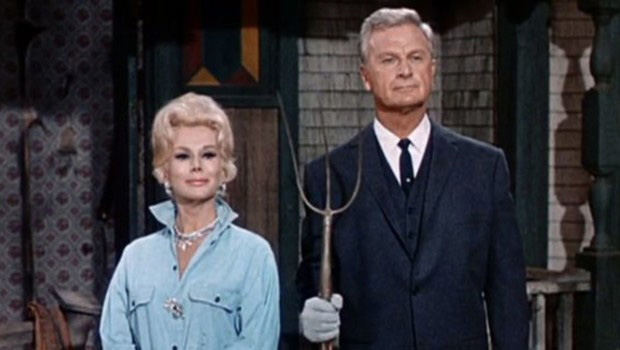
LS: Was this professional?
RK: Yeah, I played professional. I got in the union in 1946. My dad called me when I got out of the Army. He says, “You want to join the union?” I didn’t know what a union was; I was only a kid then. And he says, “Give me 400 bucks I’ll get you in the sound union,” whatever that was.
I got the union card and played ball through the year 1952. Then I got married and figured I’d better get a legitimate job. Baseball was too much fun. It was too easy. And I remembered the union card. Television was just taking off; it was becoming pretty popular then. And all the places were looking for people. So I went to RCA which was over on Sycamore Street. They had a sound studio which was kind a showcase for their equipment. They had two dubbing stages and a scoring stage, nice machine room, and they had a little transfer channel – it was great.
So I got a job as a cable man working on a series, a western series. I never worked so hard in my life. It was the worst job, I think. In fact, I think I ranked right below the guy with the shovel behind the horse. I didn’t like it, but anyhow, I promised the guy I’d finish it so I did the rest of the season. Afterward I came in and said, “Look it, I don’t like the job. If you’ve got something inside, okay. If not I’ll go back and play ball again.” So he had a machine room job opening up and I took it and I liked it.
My timing was good. You wore a little nicer set of clothes, people spoke to you like a real person, and you weren’t the bottom on the totem pole. And I worked at RCA until 1960, and then I came over here. I’ve only worked in two places, RCA and here. Starting in ’60 I worked in optical transfers for three or four years and then I talked to Fred Hynes who ran the place at that time and I told him I’d like to be a mixer. Doing optical transfers was unique in that you had a lot of 16 mm jobs come in from all over the country. And while making the transfer, I’d remix them. I had only one track to work with, but if I didn’t like the level I’d raise it or lower it. So I really got a critical ear at that point. I was fortunate; I just did things on my own. And sure enough a couple of years later they made me a mixer and boy, I loved doing dialogue. They put me to work doing the old Filmways shows, Beverly Hillbillies, Green Acres, Petticoat Junction, The Addams Family. We’d do one in the morning and one in the afternoon. I did sound effects.
And then all of a sudden the other mixers all retired. They were all old guys and I was a kid, I was 30 years old. And I was the only one left. So I did the dialogue on these shows for about four or five more years because they were all long running shows and then we had a feature come in the door and nobody to do it so they put me on it. My timing was just perfect. I’m the luckiest guy in the world. I’d be the first to admit that. And I think most everything you do in this business is luck, timing and luck. You have to be able to do the job and do it well, but I think without the break most guys would never be where they are. And I’ve never felt that I was any better than anybody else. I was fortunate to win awards and all that stuff. I just figured I was a lucky guy.
“I didn’t think we were making any revolutionary moves. In fact, I don’t see any revolutionary moves.” – Robert Knudson
LS: So what was your first feature?
RK: First feature I ever worked on as a supervisor was called Electra Glide in Blue. Then I did Cabaret next with Art Piantadosi and Dick Tyler. It turned out great. It’s one of my favorite movies, and I got nominated. I was in the lobby one morning after we’d just wrapped the show up and Fred Hynes came running down the stairs and he says, “Congratulations you got nominated.” I said, “Freddie, I ain’t running for nothing.” Honest to God, I didn’t know what an Academy Award was. But it got nasty. [Arthur] Piantadosi fought to get the nomination for himself because it was a musical and he did all the music. [In those days the Academy only nominated one mixer for each show.] But anyway, the Academy gave it to me. I think that what you get in life, that is, if you want something bad enough you won’t get it. I was totally unprepared for this and fortunately we won. And from those two pictures, Electra Glide and Cabaret, I got the picture Exorcist. Bud Smith was the editor and he took Billy Friedkin over to see both of those pictures and Billy said, “Okay, we want him to do this picture.” And it turned out great. We did Exorcist then we won that – two years in a row we won – at the little joint over here on Seward Street.
LS: I remember…
RK: But anyhow it was a good experience and from there I just started doing features.
LS: We consider sound now to be a very creative part of the filming process. I wonder if it was considered the same way then.
RK: I think you were able to make suggestions and have them listened to more in those days. In all fairness, I will say that most directors, the Streisands, the Taylor Hackfords, the Friedkins, they’re all very bright people and they learn quickly. And you know Barbara is just – she’s a genius I think. Her mind works so well. When you do a picture with her now she’s light years ahead of you and what you’re thinking.
LS: Did it just come instinctively to you to know the right comments to make and when to make them?
RK: Well you know I’ve always said to myself, if I didn’t know how to handle a customer the first day he walks in – the director, the producer, whoever it is – in about ten minutes I was going to lose. It was going to be a bad show. So I trained myself to be able to know whether he wanted help, whether he wanted me to tell jokes or he wanted me to laugh at his jokes, I mean I had pretty much a handle on this guy going in. Some people, you just never get a handle on and it’s not a fun mix. It’s just a mix. It usually turns out okay, but it’s nicer when you know how to handle a person, how to treat them – because everybody has to understand other people to get along. And that’s what I felt my long suit was. I’m not a technical person and I never advertised myself as one. I’ve always been just a guy that knew how to get along, how to make the dialogue work. And I had a great guy working with me named Bob Glass. He’s not with us anymore. But if they’d say, “Hook up the reverbs,” la de da and all that stuff, I’d say, “Bob go get ‘em!” And he was great. He was an MIT graduate. He knew our console – an old 70 mm console that used to have four rotary pots with two sub-masters, I think. Then we grew up and we finally got a nice console in there.
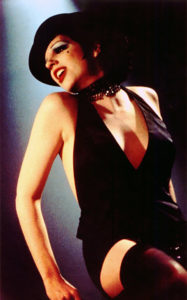
LS: I want to get back to William Friedkin. You did three movies with him.
RK:I’ve done about six movies with him. I did some little ones that never were big names though they were fun movies.
LS: Of course he is one of my heroes. He was one of the reasons why I wanted to get into sound. After seeing The French Connection and The Exorcist, I thought wow, sound can really do something…
RK: Last week we [Todd-AO] just finished redoing The Exorcist. [The 6-track digital re-release.] He wanted to make a contemporary movie out if it. And it’s very good, it’s just different. What I liked about the first mix was that the sound job seemed to lend itself to the type of picture it was. It was just a dark movie with a dark soundtrack. It was just great. I think I’ve heard more people tell me that that was one of the best sound jobs they’ve ever heard. It was simple, I mean except for reel one.
LS: It scared the hell out of people.
RK: It was probably the most complete – there was not much I could ever go back and redo. By today’s standards I’d probably go redo the whole thing. That’s the one reason I think Billy wanted to make it a contemporary picture, because it just wasn’t like soundtracks today – the dialogue was back farther. The effects were – he’d go from noise to absolute silence, absolutely stone nothing. And now he’s filled those spots. There’s noise in them now.
LS: I wanted to talk about E.T., which you won an award for also. Was that the first time that you encountered this idea of sound design?
RK: I don’t know whoever started that. It came from up North I guess.
LS: I think so.
RK:They put a good name on it. It seems to work. Everybody likes it.
LS: There were vocal effects and certain sounds for the creature. Was that the first time you encountered anything on that level in terms of the use of sound?
RK: That was after Exorcist. Exorcist was the first encounter with weird sounds. And I guess they can do all that now, with this high-tech equipment, by pushing buttons.
“I think most everything you do in this business is luck, timing and luck.” – Robert Knudson
LS: Well you still need to have the ideas.
RK: Yeah, right.
LS: Was there a turning point in sound for movies where all of a sudden the sound effects played a much more important role? Did you feel like it was different when you did The Exorcist? Was it changing at that point?
RK: No, I didn’t think we were making any revolutionary moves if that’s what you’re trying to find out. In fact, I don’t see any revolutionary moves. I give credit to the guys up North. They started making weird stuff, you can call it weird or whatever you want to call it, and they did a great job. Everybody’s got a piece of their job to do and I think they took it to the limit, which is great.
LS: Directors kept coming back to you. I remember I worked with John Cassavetes on A Woman Under the Influence. We started mixing it at the American Film Institute…
RK: We worked on that too.
LS: He came over here and finished it. To be able to say you worked with both Steven Spielberg and John Cassavetes – I mean that’s the most amazing thing.
RK: Well Cassavetes was a real stickler – he would watch my hands and if I’d even come close to touching the pots, he’d say, “Oh no, don’t touch that one! I like it like that.” And Streisand was a lot the same way. I never will forget the very first foot of the pre-dubb, there was a line that – I reached up to hit stop and she was getting ready to tell me to stop. She said, “You and I are going to get along good because we both think the same way.”


